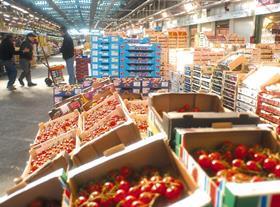
At the end of September, representatives from wholesale markets across the world converged on Paris, France, for the second WUWM (World Union of Wholesale Markets) conference.
Marc Spielrein, chairman of Rungis Wholesale Market in Paris, introduced the occasion, which coincided with the 40th anniversary of Rungis. “The holding of the second WUWM conference here in Paris marks the final celebration of the 40th anniversary of Rungis, the world capital of fresh produce,” he said.
Both Mr Spielrein and WUWM chairman Graham Wallace stressed the importance of wholesale markets and the common values espoused by different markets located across the globe.
“Wholesale markets not only provide a very efficient way of distributing fresh produce, they are also increasingly important for the support they provide to small and medium-sized businesses,” Mr Wallace told delegates. “Markets must be a model of best practice for energy efficiency, food hygiene and safety, health, the treatment of animals and sustainable development.”
During the conference, various models for the future of wholesale markets were offered up, the importance of sustainable logistics and cooperation was stressed, and the role that brands can play in the development of wholesale markets was discussed.
“Road transportation accounts for 23 per cent of all emissions in the EU, whereas freight represents only a third of that figure,” said Dr Andrew Palmer of the Centre for Logistics and Supply Chain Management at Cranfield School of Management, UK. “We need to move from road to rail and waterways, reduce the number of empty truck journeys, increase energy efficiency and use different fuel types. If we do this, we can achieve a 70 per cent decrease in CO2 emissions and a significant reduction in costs.”
Dr Palmer highlighted the fact that simple changes could go a long way to reducing both costs and helping the environment. Studies, he said, had shown that drivers can save as much as 20 per cent in fuel consumption simply by driving in a fuel-efficient manner.
Torben Flinch of the Copenhagen Wholesale Market said that efforts were being made to reduce energy use at the Danish market to lower costs. He announced that plans were progressing to move the market from the city centre to the suburbs.
Julian Briz Escribano, a professor at the Polytechnic University of Madrid, pointed out that, for consumers, trust was increasingly important in today’s fast-changing world.
“Wholesalers have traditionally enjoyed this kind of relationship and should therefore take advantage of this,” he suggested. However, he added that, although there was clearly a need for change to guarantee the survival of wholesale markets, there was no one-size-fits-all model: “Each wholesale market has to seek its own solution.”
Thierry Mouneyrac, MD of Mouneyrac Rungis, stressed the need for wholesalers to differentiate themselves in order to attract consumers. “We need to provide products that are different from those in the supermarkets,” he said. “Taste is the most important thing. If wholesalers want to survive they need to become increasingly specialised. You can’t be a specialist in everything.”
Bruno Dupont, chairman of the French national fruit producers association, said that cooperation was the most important thing for the survival of both wholesalers and producers. “We all need to work together – consumers, retailers, producers and wholesalers,” he said. “So transparency, information-sharing and trust are absolutely vital.”
Concluding the conference, Mr Spielrein said that the days when wholesale managers acted purely as hands-off real estate managers were over. “We must be more proactive, working on meeting the needs of consumers, investing in necessary things like marketing and communication,” he said. “We must work hand-in-hand with the operators to develop strategic plans for the future.”
Following the conference, delegates were offered a guided tour of Rungis wholesale market, said to be the largest food market in the world.






No comments yet